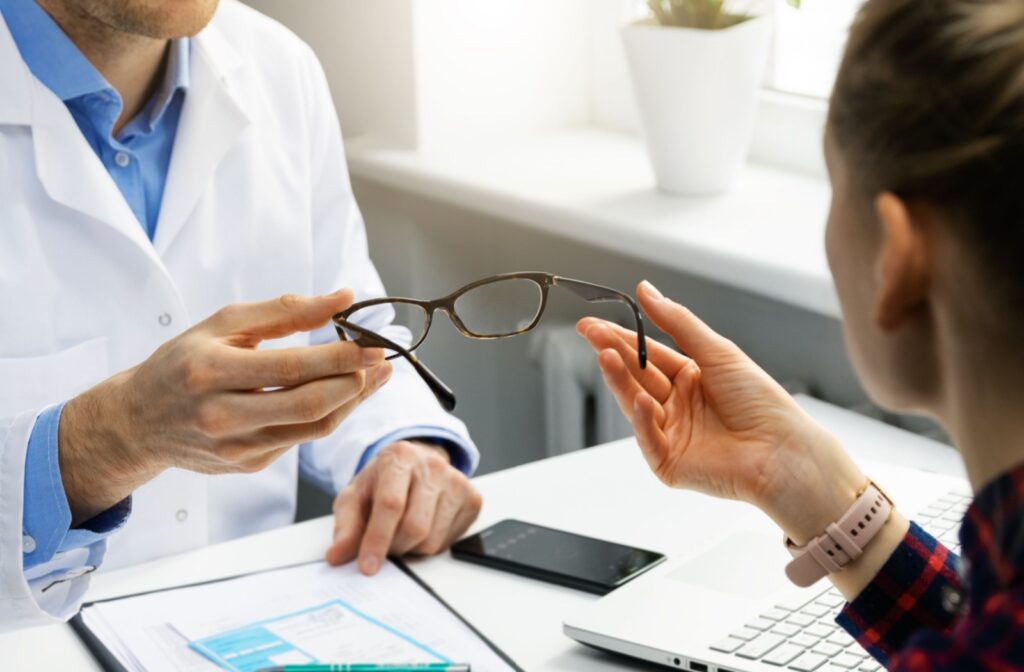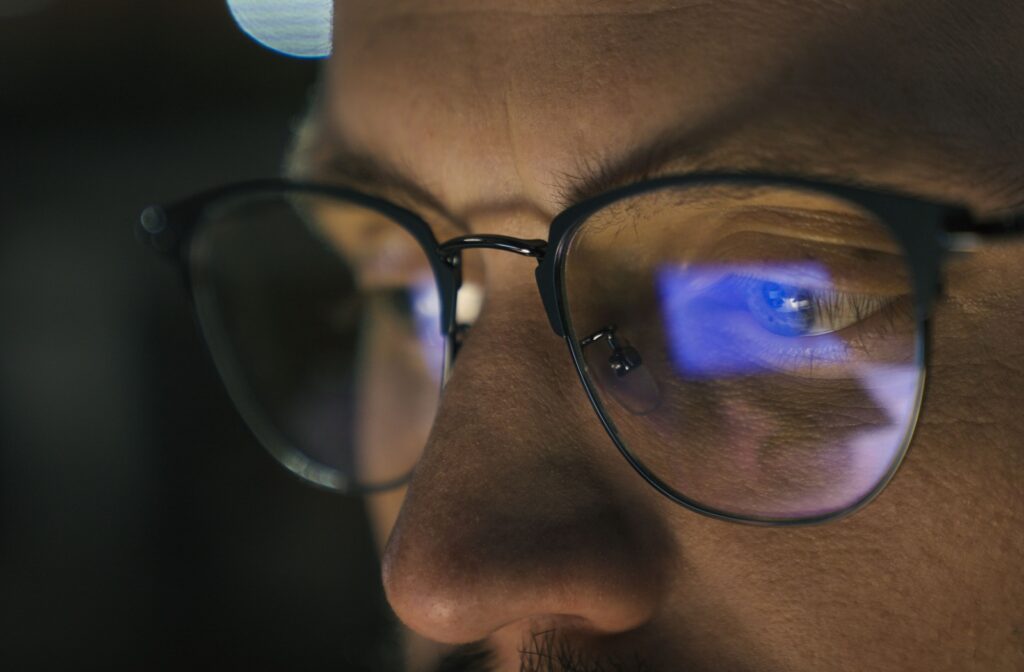Blue light is a popular topic these days, especially for anybody who spends most of their time using screens. Many people notice unusual side effects from prolonged screen time, which can cause problems like digital eye strain and changes in sleep patterns. So, what can you do?
If you spend significant time using digital devices and computers, blue light filters may help. They reduce the amount of blue light that reaches your eyes, which prevents unwanted side effects. If you wear prescription glasses, a blue light filter on your lenses can make screens much more comfortable on your eyes.
What Is Blue Light?
Blue light is a type of visible light with a short wavelength and high energy. It’s naturally emitted by the sun, but our digital screens, LED lighting, and even fluorescent bulbs are also significant sources. During the day, blue light boosts alertness and helps keep us awake and focused.
We’ve evolved to associate blue light with daytime. When the sun is up, our brains try to stay productive. When the sun goes away, we produce melatonin, a chemical that helps us stay asleep.
When exposed to blue light later in the day, your circadian rhythm adjusts. This can lead to disrupted sleep patterns and difficulty falling or staying asleep, which can have lasting effects on your overall health.
The Effects of Blue Light on Your Eyes
The biggest concern with blue light exposure is how it affects sleep and comfort. Staring at screens for hours makes it harder for our brains to prepare for rest. This is because blue light messes with the circadian rhythm, the natural process that guides your sleep-wake cycles.
Over time, this can lead to:
- Difficulty falling asleep
- Poor sleep quality
- Increased risk of insomnia
- Fatigue and lack of focus during the day
Too much screen time can also cause discomfort tied to digital eye strain. Although blue light doesn’t directly cause strain, both share similar sources—like prolonged screen use and glare. Being mindful of how much blue light you’re exposed to—especially after sunset—helps prevent these problems.
What Are Blue Light Glasses?
Blue light glasses aim to filter or absorb some of the blue light emitted from screens to improve your overall viewing experience. These glasses are popular for screen-heavy lifestyles and are available with or without prescriptions.
These glasses use special chemical coatings, filters, and lenses to block and absorb certain amounts of blue light. They come in prescription and non-prescription forms, making them easily accessible to anybody who relies on screens.
While they aren’t a cure for all screen-related discomfort, they work well to reduce the effects of blue light. If you regularly use digital devices later in the day, these glasses and filters can make screens significantly more comfortable and prevent the negative effects of blue light.
Do Blue Light Glasses Help with Eye Strain?
Blue light glasses aren’t a magic solution for digital eye strain. Blue light doesn’t cause eye strain itself. However, it can cause similar effects over time.
Digital eye strain develops when the tiny muscles in your eyes are overworked. These muscles help you focus at different distances and keep your vision clear. However, when you focus intensely on screens, these muscles tire out, leading to:
- Blurred vision
- Headaches
- Dry or irritated eyes
- Difficulty concentrating
- Neck and shoulder pain
Then, when you factor in changes to your sleep pattern, these symptoms often worsen.

Tips for Dealing with Blue Light & Eye Strain
While blue light glasses can help prevent the negative effects of blue light, they don’t entirely stop eye strain. However, when used alongside other habits, you can make screen time much more comfortable for your eyes.
Here are some simple tips to incorporate into your routine:
- Follow the 20-20-20 rule. Every 20 minutes, focus on something 20 feet away for 20 seconds to give your eyes a break.
- Adjust your screen settings. Use warmer tones at night, make sure your screen’s brightness matches the ambient light, and enlarge text size for easier reading.
- Position your screens correctly. They should be 20–24 inches from your eyes and slightly below eye level for ergonomic comfort.
- Make an effort to blink more frequently while working. This prevents dryness caused by reduced blinking from intense screen focus.
If you frequently experience strain and eye discomfort when using digital devices, visit your optometrist. They can give you personalized advice on keeping your vision comfortable.
Where to Get Blue Light Glasses
If you think blue light glasses might help improve your screen comfort and sleep, it’s time to act. Contact our team at Total Vision Golden Hills, and let us help you find the comfort you deserve.
Together, we can explore your options and find an approach that works for you. Book your appointment with us today!



